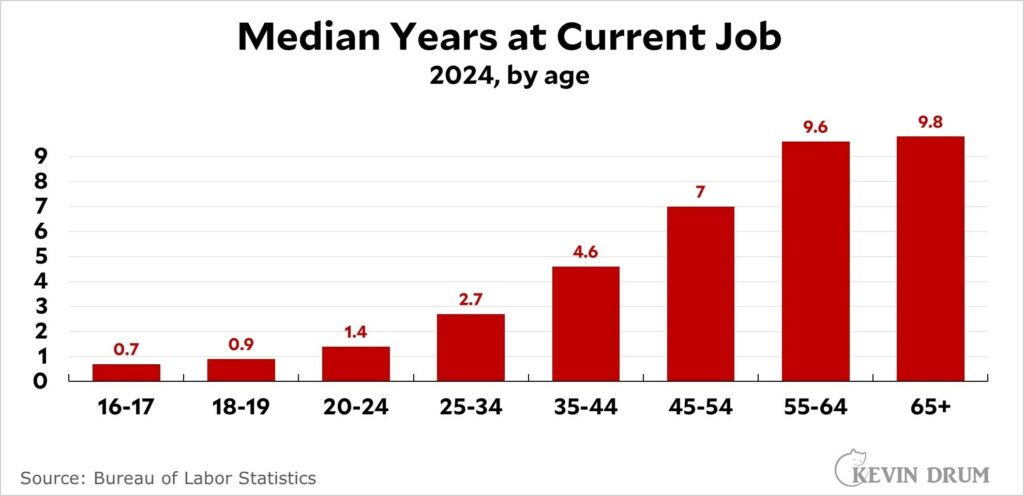Job continuity in America
I recently retired after working for the same employer for 37 years. My dad also worked ca. 35 years for his employer before retiring, as did my father-in-law. My sister worked for her employer for 40 years. Two of my sisters-in-law worked for their only employer for about that long. My daughter, on the other hand, is on her 4th employer since finishing law school ten years ago.
Most folks switch jobs several times during their working years. Kevin Drum brings some data on US job tenure over at Jabberwocking.com. He notes that job tenure (median years at current job) has declined in the 35-44 age group since 1984, although the magnitude of decline doesn’t seem that impressive (from 5.2 to 4.6 years).
He also breaks out the data by age group. My sister, wife, sisters-in-law and I are all in the 65+ demographic, where the median years in current job is 9.8; we’re all a couple standard deviations away from that. In my daughter’s demographic, though, the median time per employer is 4.6, so she isn’t that far from the norm.
People change jobs for many reasons. People also stay in the same jobs for lots of reasons. Health insurance used to keep people tethered to their employer, but I gather that the ACA has changed that.
Job tenure in America


Does it make sense to stay in one place, one job the rest of your life? Is that a positive view of a person? It seems to be such as employers will ask why you left after two or so years.
If you jump ship in less than a year, it may be for all the wrong reasons, or maybe a bad fit, and or maybe the job was sold to you incorrectly as being something it is not. A person seeking a job really has to be careful as an employee and as someone job hunting. There are tell-rale signs a company is in trouble, a bad fit, and much of it has to do with employee turnover. One way to know is where is the last employee. Still there, left, or fired (if they will tell you).
I am not so sold on staying in one place either. If you move around between industries, you can add to your background while young. As you age, finding one place where you “think” you are safe, can still grow and be an asset, and thrive is important.
An example: Early 1980s was terrible. I was there for over 4 years and doing well. Improved distribution of components to 8 facilities, lowered inventory, improved scheduling of the shop floor, etc. Then the recession hit.
Time to reverse thinking and planning. Demand dropped off. So I had my people cut manufacturing lots. It was a race to the bottom. We did win as my mediocre boss thanked me for cutting our lots as purchasing canceled orders,
Plant manager came to me looking for work. I offered up running parts we could not run when demand was heavy, he said no, He wanted the high demand stuff. I said no.
It really does not matter how good you are or what age you are. You are expendable to companies. Even after the Division Director of Accounting came to me and told me our department kept the company profitable or breakeven, it did not matter. I was laid off two weeks before Christmas. Never said my old boss again. He was fortunate. He could not do what I did.
Your age only matters if you need to look young in your position. I was in my thirties then. So that did not matter. What matter was my unwillingness to sign a document that was a lie. He told me then. I would regret it. I did find other work and progressed nicely.
Being at the same company for decades is great. I would have liked to do such. Except economic conditions and the need for growth interfered. I worked for over 40 years and also maxed out SS. I am still in demand. This time, I do not need them.
If you can stay with a company for long term do it for at least 4-5 years before you move on. That is, if the economy lets you do so.
@Bill,
Rebecca’s first job out of law school was a term-limited one-year clerkship with the state court of Southern Vermont. So her job change after that was baked in the cake. What impressed me more is that she moved to AZ without a job offer and got one within a month, then three years later moved to MA without a job offer and got one within a month. And she landed her current job, working from home, on her own.
I might well have changed jobs but we had to solve the two-body problem. Was my interest in changing jobs more justified than my wife’s interest in keeping hers? That’s a high bar.
All the people I mentioned in my post except me and my wife were in non-academic jobs. And my wife was in a non-tenure track position. I feel like I got a great deal. I went on a phased retirement contract for my last five years, that gave me 70% of my peak base salary, and way less than 70% of the responsibilities. Indeed, the last two years of the contract, I was living out-of-state. Not many companies would let you do that.
Could I have done better financially in Pharma? Perhaps. Would I have been happier? From what I’ve seen, probably not.